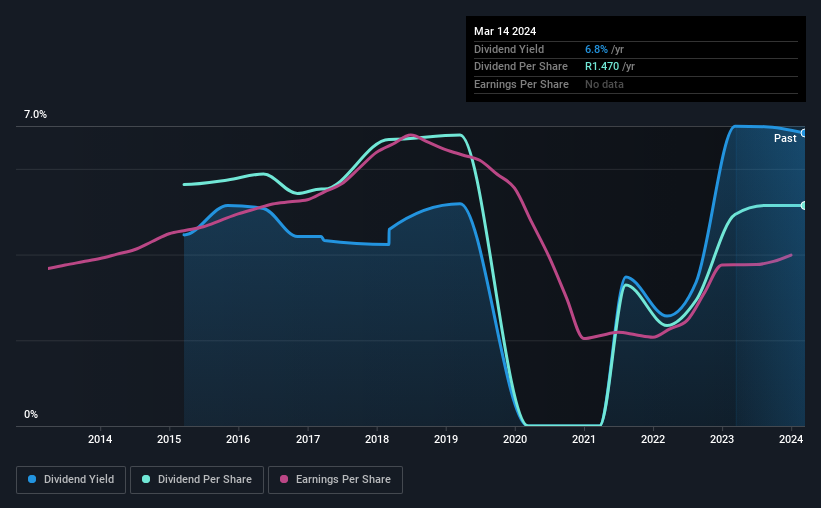- South Africa
- /
- Specialty Stores
- /
- JSE:WVR
HomeChoice International's (JSE:HIL) Dividend Will Be Increased To ZAR0.83
HomeChoice International plc's (JSE:HIL) periodic dividend will be increasing on the 15th of April to ZAR0.83, with investors receiving 7.8% more than last year's ZAR0.77. This will take the annual payment to 6.8% of the stock price, which is above what most companies in the industry pay.
See our latest analysis for HomeChoice International
HomeChoice International's Dividend Is Well Covered By Earnings
We like to see robust dividend yields, but that doesn't matter if the payment isn't sustainable. Based on the last payment, HomeChoice International was earning enough to cover the dividend, but free cash flows weren't positive. We think that cash flows should take priority over earnings, so this is definitely a worry for the dividend going forward.
Unless the company can turn things around, EPS could fall by 8.7% over the next year. If the dividend continues along recent trends, we estimate the payout ratio could be 50%, which we consider to be quite comfortable, with most of the company's earnings left over to grow the business in the future.

HomeChoice International's Dividend Has Lacked Consistency
It's comforting to see that HomeChoice International has been paying a dividend for a number of years now, however it has been cut at least once in that time. This suggests that the dividend might not be the most reliable. The dividend has gone from an annual total of ZAR1.61 in 2015 to the most recent total annual payment of ZAR1.47. Doing the maths, this is a decline of about 1.0% per year. Declining dividends isn't generally what we look for as they can indicate that the company is running into some challenges.
Dividend Growth May Be Hard To Come By
Growing earnings per share could be a mitigating factor when considering the past fluctuations in the dividend. HomeChoice International has seen earnings per share falling at 8.7% per year over the last five years. A modest decline in earnings isn't great, and it makes it quite unlikely that the dividend will grow in the future unless that trend can be reversed.
HomeChoice International's Dividend Doesn't Look Sustainable
In summary, while it's always good to see the dividend being raised, we don't think HomeChoice International's payments are rock solid. While the low payout ratio is a redeeming feature, this is offset by the minimal cash to cover the payments. We would probably look elsewhere for an income investment.
It's important to note that companies having a consistent dividend policy will generate greater investor confidence than those having an erratic one. Still, investors need to consider a host of other factors, apart from dividend payments, when analysing a company. Just as an example, we've come across 3 warning signs for HomeChoice International you should be aware of, and 2 of them shouldn't be ignored. If you are a dividend investor, you might also want to look at our curated list of high yield dividend stocks.
Valuation is complex, but we're here to simplify it.
Discover if Weaver Fintech might be undervalued or overvalued with our detailed analysis, featuring fair value estimates, potential risks, dividends, insider trades, and its financial condition.
Access Free AnalysisHave feedback on this article? Concerned about the content? Get in touch with us directly. Alternatively, email editorial-team (at) simplywallst.com.
This article by Simply Wall St is general in nature. We provide commentary based on historical data and analyst forecasts only using an unbiased methodology and our articles are not intended to be financial advice. It does not constitute a recommendation to buy or sell any stock, and does not take account of your objectives, or your financial situation. We aim to bring you long-term focused analysis driven by fundamental data. Note that our analysis may not factor in the latest price-sensitive company announcements or qualitative material. Simply Wall St has no position in any stocks mentioned.
About JSE:WVR
Weaver Fintech
Operates as a fintech company, provides financial services.
Proven track record with slight risk.
Market Insights
Community Narratives



